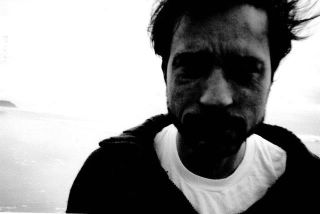Have Microphone, Already Traveling
That may be one of the most clichéd subject headings I´ve ever written, and I´ve written my share. Still, it´s so where I am at right now.
To bring you up to speed: I´m writing at an internet cafe (1200 Bolivars per hour, about 50 cent, a little expensive) in Valencia, Venezuela. I taught English here for about 3 weeks in December to upper-class folks. I appear to have some karma in Valencia, because I keep having to come back here... and it´s an interesting city, very near where Simon Bolivar won the Battle of Carabobo that finally finished off the Spanish. But as Venezuela´s second-larges city, and a major industrial center, it leans a little more to the right than I´m comfortable with.
I kind of hoped to find some folks who support the Chavez government, because purportedly, more than half the country does. But one thing I´m realizing is, as a white guy on my own, with only passable spanish, I don´t get access to poor people. They are live in endless shanty towns that ring all the South American capitals. Without contacts, I only get to interact with people roughly in the same social class as me, which are the Chavez-hating people with college degrees.
The funny thing is, here, if you support the Chavez government, the people who went to the University think you´re a little dumb. I find it interesting that the folks in the US who hate Bush and want to leave the country (like many of my friends) are also the educated class. Though we aren´t quite considered as elite in the US as University-educated folk are "Latin America", we are still in the same global privileged class. It´s sort of like... privilege everywhere, whether left or right, when it doesn´t get what it wants decides to take it´s ball and go home. And of course, we can observe in "Latin America" right now that its the under privileged, those without all those "choices" and "options", who are actually putting their feet down and creating some democracy. Cuz they don´t have any other options, other than escaping to a crappy job in the US.
Anyway, almost everyone to whom I was teaching English either intends to do business with the US, or wants to move to the US to get out of their dangerously left-leaning country. And by the way, yes, they all have lighter skin, enough that people talk to me in Spanish in these neighborhoods. They look just like the people on the TV!
But you´ve heard enough about that from me (though I´m not quite finished writing about it) but it´s time to get some serious work done.
KBOO and I have been fortunate enough to receive a Paul Robeson Fund for Independent Media grant by the Funding Exhange - $5,000 to build a documentary series on the diversity of communities in Central and South America. That is amazing! The difficulty is that I had to split with my partner in order to accept the grant. That makes my work a lot harder, with my level of Spanish. But I have a plan, and I´d like to share it with you - here, on this three-month anniversary of crossing the border at Nogales, AZ.
Goal: to record audio from 10 to 15 communities in "Latin America" and create short 5 to 10 minute audio features highlighting some feature of those communities. Upon return, edit and assemble the features into a 5-part documentary, in both Spanish and English. The pieces will be grouped into themes, which will probably reflect the influence of the US on this vast region. We will try to distribute the documentary, in whole or in part, as widely as possible.
Method: 2 months in Central America has yielded audio from 5 different communities. Because I`m a non-native spanish speaker who is obviously a gringo, success will depend upon my ability to seek out and make relationships with groups whose goals fit this project. The grant allows for 20 weeks of $100 stipends, which will allow me to pay the travel and living expenses for partners who want to assist me.
My resources are:
-- human rights and social justice organizations for interviews and contacts
-- independent media groups and organizations for recruiting partners
-- the World Social Forum in Caracas in late January and make as many contacts as possible.
I will attempt to cover as much ground as I possibly can, but logistics of getting around an entire continent and trying to establish real relationships, and the luck of the contacts that turn up will ultimately form the shape of this work.
I will detail the equipment we are using, and have been using, in another email. Any equipment bought with grant funds will go to KBOO to help develop Spanish News and Public Affairs.
You´ll hear more about the people we meet and organizations we work with, as well as the politics and the realities of "Latin America" as we experience it in the coming months. And, you´ll get bits and pieces of what´s gone on in the past three months, as appropriate... with more reminders that only you (us) - that is, privileged folks from the US - can stop our government before it kills again. With the election of Evo Morales as the first indigenous president of Bolivia, we again get an example of what democracy might look like from the folks who have the least to work with.
here´s an article about Evo Morales, with a good summary of the recent situation in Bolivia.
From the article:
I respect Cuba a lot. When it comes to Che Guevara, our only difference is the
armed struggle--I don't accept armed struggle. Maybe it was the way in the
'50s and '60s, but we want a democratic revolution.
http://www.inthesetimes.com/site/main/article/2438/


0 Comments:
Post a Comment
<< Home